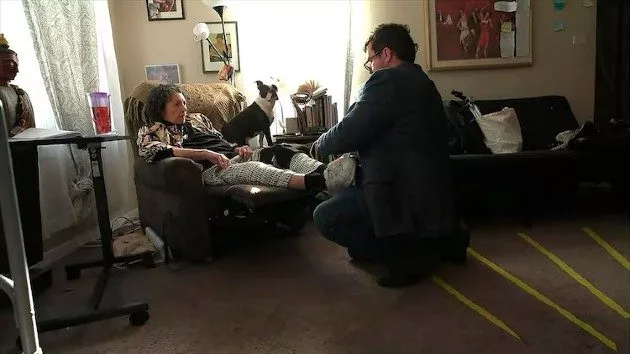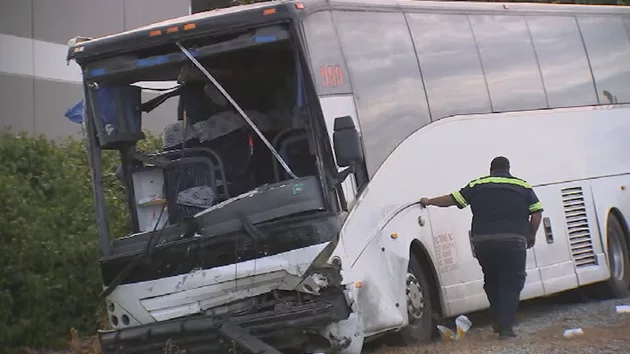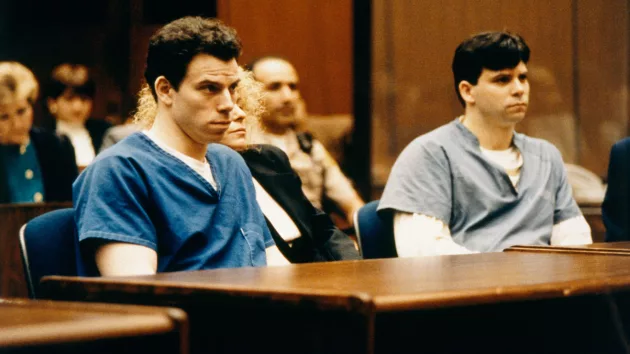
(CHICAGO) — Janice Will was diagnosed in 2012 with Parkinson’s, a condition that causes parts of the brain to deteriorate, causing tremors and balance problems.
“When she broke her femur and it was close to the artery…it could have been lights out,” Brandon Will, Janice’s son, said about his mother.
Brandon, who lives with his mother near Chicago, Illinois, soon realized his mom needed 24/7 access to care.
Since then, Janice, who is now 73, has seen the emotional, physical and financial strain of needing care and spoke to ABC News about often feeling like a burden to her son.
“He likes to tell me I’m not a burden, but I feel like a burden because he would have been on a career in New York…he sort of edited his dream to be different, by including me.”
Brandon, 42, reminds his mom that she is not weighing him down, telling her, “Parkinson’s is the burden. It’s one we share.”
“I think people get to these points where there is an illness or something that comes earlier than you’d expect. You realize how many systems aren’t in place,” Brandon told ABC News.
Janice and Brandon’s story mirrors the struggles many Americans are forced to reckon with when a loved one falls ill.
In the U.S., 48 million people have taken on the role of becoming a caregiver to a family member — with little to no financial help, according to Susan Reinhard, formerly the senior vice president of AARP’s Public Policy Institute and chief strategist for the organization.
“There are 48 million family caregivers who are unpaid. And if you did have to pay them, it would be $600 billion. I keep emphasizing the billion dollars because it’s quite amazing. It’s more than all out-of-pocket spending in the United States on health care,” Reinhard told ABC News.
Reinhard said that caregivers need support to avoid a financial crisis, saying the services many seek are provided through the state and federal program called Medicaid, but access and resources vary state by state.
And while help is out there, Brandon and his mom could only access the Medicaid benefits they needed in Illinois, moving from Michigan to be able to do so.
In Illinois, Brandon applied through Medicaid to get paid as a familial caregiver. However, he only gets paid for 19 hours a week, even though he provides around-the-clock care for his mom.
“I’ll hand her her clothes in the morning, help her pick out an outfit…just ‘cause she can’t, at this point, stand in front of the closet.”
His hourly rate is less than the state’s minimum wage.
Brandon and Janice are still researching and applying for as many benefits as they can to stay afloat. They are currently using the Meals on Wheels program in their area and are looking for a part-time caregiver so Brandon can focus on his career outside of care work.
However, he says the state and federal program is already stretched thin. “There’s like 20,000 people on the list in Illinois who are like us, who qualify for a home health aide. And they just aren’t available.”
In January, Brandon and Janice Will hosted an open mic, sharing stories through the viewpoints of those living with caregiving, disability, illness and aging.Now, Brandon Will has concerns following the Trump administration’s executive orders to remove diversity, equity, and inclusion efforts.
“With these orders to kind of remove all the DEIA. This administration, they added the A to the end of it that was never there and it’s for accessibility,” Brandon told ABC News. Brandon said his and his mother’s fears spurred him to start the open mic reading series.
“I think anybody who is dealing with disability or aging or caregiving knows that like willpower only gets you so far. You know, like you need it. It’s crucial. But, you know, you can’t really get anywhere without a community,” Brandon said.
To caregivers — even minimal resources can be crucial while juggling two or more jobs. An AARP report highlighted that 60% of family caregivers are working jobs in addition to being caregivers; 40% are men, but, at 60%, it is mainly women taking on this role. And on top of having a job and doing care work, 30% of those caregivers take care of their own children, too.
People like Ty Lewis.
In an apartment complex just outside of Los Angeles, Lewis, 45, and her husband are caring for Ty’s mother, Gertrude Jordan.
Jordan, 80, was diagnosed with Alzheimer’s nearly 10 years ago, a disease 6.9 million Americans are living with. Lewis explained watching her mom’s slow progression throughout the years has been hard. “As a woman, it kind of shakes you. It does something to you because it’s just like … that’s your mom, the woman that gave birth to you.”
Lewis told ABC News her mom still receives a pension of $66,000 annually from her years of teaching –but it’s not enough. Her care each month costs more than $6,000.
“Last year was $90,000,” Lewis said about the annual cost of her mother’s care in 2023. “She only made $66,000. She doesn’t have it. Her savings are depleted. Currently, we are not getting any support because they keep saying my mom makes too much money. Just recently, my mom’s balance was $3.14.”
The financial strain cuts deep into both families. But it’s not just about the money. Each caregiver acknowledged the emotional and physical challenges they face daily — adding to the difficulties of the job.
“Caregiving has shifted things in me. Because it’s not really happening in everyone’s home or you don’t see it, people really don’t understand the magnitude of what’s coming,” Lewis told ABC News.
In December, Lewis went to Capitol Hill to advocate for the Older Americans Act (OAA), which targets older adults who are in greatest need by improving support for family caregivers and direct care workers and expands healthy aging programs. The Senate passed reauthorization for OAA in December and the bill is currently pending in the House.
Lewis also is pushing for care givers to be able to qualify for Medicaid. “I want it to look the same from state to state for every caregiver,” Lewis told ABC News.
AARP’s Reinhard warned Americans, saying, “If we do not help family caregivers, if they can no longer do what they’re doing, then we’re going to have a huge cost problem. There is definitely a care crisis in America right now.”
Taking each day in stride, Lewis hopes to spread awareness on the struggles caregivers face daily, documenting her journey with her mother by posting clips on social media.
“I want people to know that they can find joy in the journey. That’s my whole mission. And so, while it is hard, I want to show people that it’s hard, but it’s doable. It’s hard, but it’s beautiful.”
Copyright © 2025, ABC Audio. All rights reserved.



